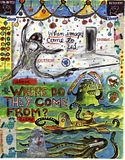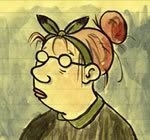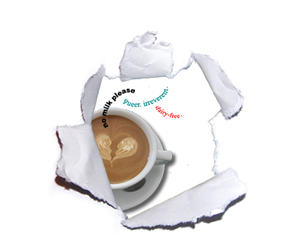 I know there's a level of trepidation one must feel when signing up for a writing workshop called "Writing The Unthinkable," but if you’re seriously considering it, let me allay your fears: it is not scary, it’s not stressful and it’s not going to be like going to the principal’s office. In fact, instructor Lynda Barry, would probably be sitting next to you getting reamed by the principal.
I know there's a level of trepidation one must feel when signing up for a writing workshop called "Writing The Unthinkable," but if you’re seriously considering it, let me allay your fears: it is not scary, it’s not stressful and it’s not going to be like going to the principal’s office. In fact, instructor Lynda Barry, would probably be sitting next to you getting reamed by the principal. Yes, it is writing intensive: you will be writing at a level and speed of which you’ve probably never experienced. It’s going to be emotional, because the workshop will be accessing your memories, your deepest feelings and imagination in a very connected manner.
There were a couple of times that I felt choked up during one of the writing exercises. I was writing and trying to hold myself together at the same time because I didn’t want anybody to think what a wuss I was, especially after I took the time to wear a football jersey to convey my masculinity.
 Kelly Hogan, our class monitor, thoughtfully pointed out at the start of the class the various locations she placed boxes of Kleenex, probably because she knew from experience how some Asian in a football jersey may need it.
Kelly Hogan, our class monitor, thoughtfully pointed out at the start of the class the various locations she placed boxes of Kleenex, probably because she knew from experience how some Asian in a football jersey may need it. I think that starting out with what the class isn’t may be easier for you to understand what it is. It is not going to teach you grammar, or how to find an agent, or how to write dialogue or plot. It’s not going to teach you how to become a famous author.
In fact, there is none of the criticism and notes that are the traditional elements of writing workshops--you’re not even allowed to look at a person when they’re reading their work out loud. Lynda’s belief is that criticism only affects the process of writing. She believes that as we grow up, we have been conditioned to self-criticize and self-edit that this has affected the way we think and create. She insists that we do not go back and read (unless you’re reading it out loud to the class) what we wrote until after the workshop. Again, it’s the process of writing that’s important.
Ultimately, it’s about connecting the power of your imagination, your emotions and memories to the physical act of writing. Once you’ve re-trained your body and mind, you can tap into this well of creativity more easily and you will spend your writing time more productively. Even if you didn’t have the best form or grammar, these elements are the key to powerful images that connect to readers.
There’s a very specific way Lynda uses to access this creativity which involves getting relaxed*, visualizing and writing down a list of images and putting yourself in the image through a series of questions. This is particularly useful if you’re going through a writer’s block. You will find listing images through key words a way to stoke the flame of creativity. This method is then linked to the physical act of writing by drawing circles on a sheet of paper until the words come out and going back to the doodling when it dries out.
 Lynda Barry is part instructor, part shaman, part den mother and stand-up comedian all rolled up into one hippie package. It’s worth the $200 just to hear her speak, tell stories, sing, dance and joke. What acclaimed author have you met has given more than a standard book reading or lecture? Lynda gave me a hug. She told me face to face, with utmost sincerity that what I wrote was good, and then, she gave me an “A” so I can brag to my friends. It’s like we all went to summer camp or a spiritual retreat but without the bullies or creepy guidance counselor.
Lynda Barry is part instructor, part shaman, part den mother and stand-up comedian all rolled up into one hippie package. It’s worth the $200 just to hear her speak, tell stories, sing, dance and joke. What acclaimed author have you met has given more than a standard book reading or lecture? Lynda gave me a hug. She told me face to face, with utmost sincerity that what I wrote was good, and then, she gave me an “A” so I can brag to my friends. It’s like we all went to summer camp or a spiritual retreat but without the bullies or creepy guidance counselor. The workshop changed a very fundamental way of how I viewed writing, which was to sit down and try to squeeze it out of my imagination. It’s changed so dramatically that I have stopped writing my novel on my laptop, writing it long hand instead, letting the images flow to my hand and directly on the paper. There’s time to edit later--that’s a different process--just write!
I think that’s the most important lesson of all--write it first. Everything else that follows, that’s something else.
 Read what SHE SAID.
Read what SHE SAID. Back to the main post
Back to the main post-----
* Lynda reads a poem by Rumi, "The Diver's Clothes Lying Empty" to relax you and put you in a writing state of mind.
 Try a "lite" version of Lynda Barry's technique: check out WordFlame!
Try a "lite" version of Lynda Barry's technique: check out WordFlame!
